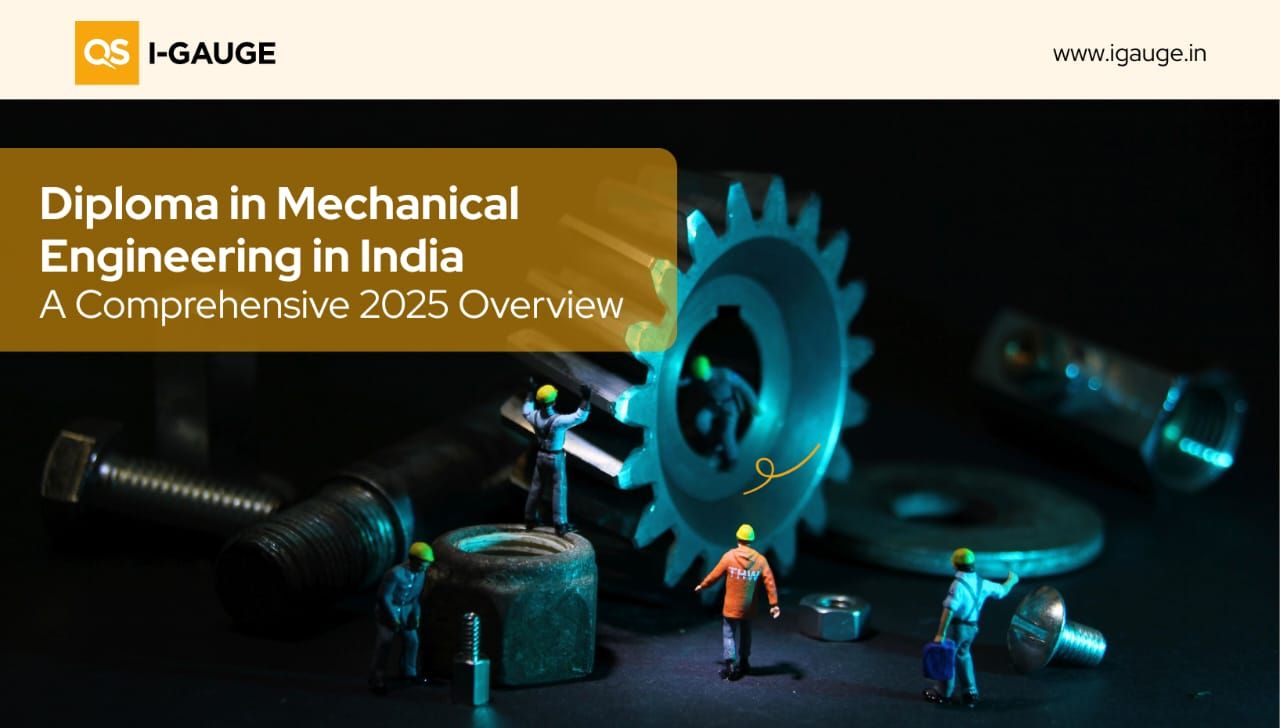
The three-year technical Diploma in Mechanical Engineering program trains students to design and construct mechanical systems while maintaining their operational state. The diploma program suits students who enjoy machines, robotics, and industrial innovation, as it provides both classroom education and practical experience. The diploma route has evolved into a strategic career path for 2025 because industries seek engineers who can begin working immediately.
Course Overview
The program spans three years, which is divided into six semesters.
- Students who finish class 10 with at least 55% in Mathematics and Science can apply for this program, although some institutions permit 12th pass or ITI holders to join the second year through direct (lateral) entry.
- The program operates as a full-time study with a curriculum that includes classroom instruction, laboratory work, workshops, and industrial internships.
- The main entrance exams for admission include JEECUP (Uttar Pradesh), JEXPO (West Bengal), Odisha DET, and other state-based polytechnic exams. Some colleges base their student admissions solely on class 10 exam merit.
Curriculum and Subjects
Students undergo rigorous training in:
- Applied Mathematics, Physics, and Chemistry
- Engineering Drawing and Computer-Aided Design (CAD)
- Mechanics of Materials and Structures
- Thermodynamics and Energy Systems
- Manufacturing Technology and Machining
- Fluid Mechanics and Fluid Machines
- Machine Design and Kinetics
- Robotics, Automation, and Mechatronics
Lab sessions and workshop modules are integral, ensuring that graduates are job-ready with practical skills for modern industry needs.
Admission Process and Lateral Entry
Most institutions use class 10 board results or entrance exam performance for admissions. The ITI and 12th science students can join the course through lateral entry and complete the diploma in two years by joining in the second year. The application deadlines vary, with most opening in the spring and closing by July for the academic year.
Fee Structure and Scholarships
The course fees ranges widely:
- Public polytechnics: INR 10,000–INR 50,000 per year
- Private institutions: INR 30,000–INR 1,00,000+ per year
Most institutes offer installment plans, and scholarships are available for meritorious, underprivileged, or reserved-category students.
Job Opportunities and Career Scope
Diploma graduates are highly sought after for roles including:
- Mechanical Design Engineer
- Production/Manufacturing Engineer
- Maintenance Technician
- Quality Control Inspector
- Robotics and Automation Technician
- CAD Designer and CNC Operator
The automotive sector, together with energy and defense, aerospace and construction, and consumer goods industries, recruits diploma holders who start as junior engineers or supervisors before advancing through experience or additional education. B.Tech / B.E. programs serve as a common entry point for many professionals who want to advance their careers.
The starting salary range for diploma holders extends from INR 20,000 to INR 5,00,000 annually, based on their experience level, sector, and geographic location. The well-known recruiters in this field include L&T, BHEL, NTPC, Ashok Leyland, Bajaj, and Ford. The salaries in core sectors increase gradually as professionals gain experience and develop new skills.
Why is a Diploma in Mechanical Engineering Gaining Traction in 2025?
The diploma shows signs of increased popularity during 2025. The current industrial drive toward automation, robotics, and sustainable engineering solutions demands numerous practically trained professionals to fill the workforce. The diploma program delivers exactly what the market needs because it teaches practical skills that align with industrial requirements.
The workforce entry speed of diploma holders exceeds that of longer degree programs because they bring immediate practical value to factories and plants and demonstrate quick adaptability to new technologies and processes. The Indian government's "Make in India" initiative, together with the growing number of MSMEs (Micro, Small, and Medium Enterprises), has expanded the opportunities for diploma engineers to work in core industries, maintenance sectors, and emerging technologies such as 3D printing and smart manufacturing. Polytechnics have started teaching digital manufacturing, CAD, and AI fundamentals to prepare diploma graduates for future job market requirements.
Diploma in Mechanical Engineering vs. Mechanical Engineering Degree (B.E./B.Tech)
Duration
- The duration for studying Mechanical Engineering Diploma is 3 years after completing 10th grade or 2 years with lateral entry.
- The duration for B.E./B.Tech in Mechanical Engineering is 4 years after completing 12th grade.
Program focus
- The diploma program focuses on practical skills and hands-on training to prepare students for the job market.
- The degree program provides students with in-depth theoretical knowledge and research and development and innovation capabilities.
Entry Requirements
- The minimum requirement for diploma admission is passing the 10th grade with 55–60% marks in Math/Science subjects.
- The admission requirements for degree programs include passing 12th grade with PCM (Physics, Chemistry, Mathematics).
Career path
- The career paths for diploma graduates include junior technician, supervisor, maintenance, and CAD positions.
- The career progression for degree holders includes engineer, team leader, design head, R&D, and management positions.
Ideal Student Profile
- The diploma program is ideal for students who want to start their careers early and work in the field while entering the industry quickly.
- The degree program is most suitable for students who want to pursue research, technical innovation, and leadership positions.
Progression Path
- Students who complete a diploma program can enroll in a degree program through lateral entry.
- The degree program leads to direct career advancement in higher positions, and students can choose to pursue post-graduation studies in M.E./M.Tech or MBA and other fields.
A diploma provides the best path for those who want to start their career early and gain industry experience before continuing their education, while a degree offers the best route for leadership roles and long-term technical specialisation.
In Summary
A Diploma in Mechanical Engineering is a smart choice for 2025, unlocking immediate career opportunities in essential sectors and providing a robust foundation for lifelong learning or professional specialisation. Its practical training, affordable fees, and strong job prospects make it a gateway to India’s modern industry, particularly valued in the era of digital transformation and manufacturing resurgence.




